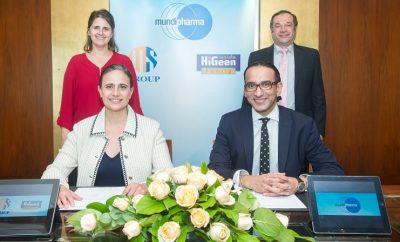Vice President of the Nigeria Academy of Pharmacy (NAPharm) and Publisher of Pharmanews, Pharm. (Sir) Ifeanyi Atueyi, has re-echoed the need for the Federal Government to urgently intervene in the scarcity of drugs and raw materials for drug production, saying this portends a lot of negative development for the health sector.
Atueyi, who spoke to the Guardian in an exclusive chat, listed the impact of forex and limited infrastructures to the industry, which included influx of fake drugs, poor patients’ outcome, exorbitant prices of drugs, and others.
Details below:
How would you describe research developments in the country with respect to your profession?
There is no doubt that research is what defines the future. And I do not know of any scientific discipline that does not value research. I can safely say that a great deal of research goes on in various faculties of Pharmacy in our universities. But of course, you and I know the situation with our universities, especially with regards to funding. Our universities are grossly under-funded. Pharmaceutical research, on the other hand, is not cheap. So, that portends a problem. Pharmacists in academia can only do the best they can within the limitations that are imposed on them by funding.
Another limitation is infrastructure. When you are a researcher, you shouldn’t ordinarily worry about diesel to power your generator and all of that. You should ideally be fully immersed in your research work. But here, working can be quite stressful and it affects the quality and productivity of intellectual work. But even with these, academics have been fairly productive in the area of research over the years, although a lot more could have been done, if the environment had been more conducive. This is why Nigerian pharmacists and pharmaceutical scientists are doing better in developed countries.
As for the pharmaceutical companies, I am not aware of any serious research and development going on, apparently because of the cost. The Nigerian Institute of Pharmaceutical Research and Development Abuja is a good initiative by the government to help drive pharmaceutical research and development. It has been productive in the past and has even done a great deal of work in the area of Sickle Cell Disease. Perhaps you’ve heard of NIPRISAN. That is a product of their research, which has been proven to be good at controlling crises outbreaks in sickle cell patients. But as with most government establishments, it needs better funding. Such a drug needs to be produced at commercial quantities and funds are required for this.
Indeed, this is one of the key areas where the Nigeria Academy of Pharmacy is striving to make a difference. We are raising awareness as to the importance of research in the health sciences in general and also encouraging wealthy Nigerians to sponsor and endow research projects and research institutes. We are also encouraging young people to pursue research-inclined careers, in the pharmaceutical and health sciences.
What impact does the lingering foreign exchange crisis have on the sector and Nigerians?
Nigerians actually pay more than what they ought to pay for medicines. Cost of medicines could be much lower, if the right infrastructure were in place and pharmaceutical companies did not have to invest so much in such overheads as power, infrastructure, distribution and even security. Also there is the fact that our pharmaceutical industry is highly import-dependent. You find that between 65 per cent and 70 per cent of finished products are imported, which means that only about 35 per cent or so is locally manufactured. You may be surprised to know that, in pharmaceutical manufacturing, practically all of the raw materials we use are imported. The implication is that, when there are fluctuations in the foreign exchange regime, as it has been in recent times, the industry is impacted very significantly.
Currently, the dollar is being exchanged above N400 at the parallel market and many pharmaceutical companies are unable to access foreign exchange at official window. This is a red flag, not only for the pharmaceutical sector, but for the health of all Nigerians. If drugs or the raw materials for drug production become too expensive, then a large proportion of the public would naturally be unable to afford them. This is what fundamentally encourages the influx of fake drugs. Unscrupulous elements in society cash in on the problem and import fake and substandard drugs into our country and worsen their health conditions or even kill them.
We are facing a real emergency situation and I believe the industry has since implored the Federal Government to intervene to facilitate access of the pharmaceutical industry to foreign exchange. The government should also consider reduced interest rate on loans by the industry. Government should give priority to the health of the citizens.
You mentioned the fact that raw materials are generally imported, what future do you see with any possible growth in the petrochemical industry?
The existing government-owned refineries focused all their attention on refining fuels and did not take the petro-chemical aspect very seriously. That is one of the reasons there is excitement around recent announcements that Dangote refinery will focus on the petro-chemical aspect as well as fuel refining. This will make a huge difference in the pharmaceutical sector and the larger industrial sector, even if it’s only a small line of petrochemical products that is made available in the short term.
I give you an example. Imagine the tonnes of plastics that are imported into the country. In the pharmaceutical industry, we use plastics for much of the packaging like bottles, syringes, corks and many others. Even food and beverage companies rely heavily on plastics. Imagine the cost savings to our economy in terms of foreign exchange, if we remove plastics from our import list by producing them. So, petrochemicals will spur our industrial sector and the pharmaceutical sector in particular, to greater heights because it will help to make most of our chemicals-based raw materials more readily accessible and affordable. This will translate to enhanced value for the larger economy because companies will deploy the savings to other key areas.
What would you say about Nigeria’s investment in human capital, particularly in your sector, as part of keeping up with global trends?
Despite the constraints in the environment, I would say that pharmaceutical training is keeping up with the dynamics of the profession. Across the world, the focus of Pharmacy has shifted. It used to be on drugs, but now the focus is on the patients. What this means is that Pharmacy is now more clinically-oriented. Curriculum is therefore evolving. Pharmacists must, in addition to all of the chemistry and pharmacology, which they ordinarily emphasise, also demonstrate clinical interest. I must say that this is already happening in Nigeria. Indeed, the Nigerian Universities Commission (NUC) has since approved the Pharm.D, or Doctor of Pharmacy degree, which is a clinical pharmacy degree. It is currently being offered at the University of Benin, and will, in due course, be adopted in other pharmacy schools across the country.
There are still challenges, with the biggest being funding, equipment and manpower. But these challenges are not peculiar to Pharmacy. They affect every sector in Nigeria. So, going back to your question, Nigeria does not invest enough in its human capital. We really ought to be doing more than we are doing. There is too much emphasis on politics and wealth acquisition and ostentation. We really need values-reorientation. Those of our colleagues who still do research in the universities are doing a Herculean job. They deserve praise.
How is the Academy going about these challenges in terms of solutions?
As I mentioned earlier, one of our objectives has been to raise awareness on the essence of scientific research and development. This advocacy is very important, because in the face of a multiplicity of interests that are jostling for attention of the government, there is a lot of pressure on available resources. Government needs to recognise the imperative of investment in training, manpower development and research and an academy like the Nigeria Academy of Pharmacy is helping to bring this issue to the attention of policy makers. Secondly, we are also encouraging the wealthy few among us, as well as public-spirited foundations, to sponsor research and development.
Funding research is a desire of the Academy, although we haven’t come to that stage yet. But whatever it is that will help to bring scientific or specifically, pharmaceutical research to the front burner, we will continue to support, because we recognise that it will have manifold economic benefits, even social ones, for our society. The only way by which we can overcome the plague of diseases like malaria and others is through committed research.
What are you doing to help to enlighten people and to drive good health among Nigerians?
You are correct that our society needs a great deal of enlightenment, especially with regard to public health issues. Pharmacists are actually doing a lot in this area and complementing the efforts of other health professionals in public enlightenment. Indeed this is a key activity that different technical groups within the profession handle. They enlighten people on the safe use of medicines and there is also a great deal of education on public health challenges like HIV/AIDS, the need for immunisation and other issues. You’d be amazed at the level of enlightenment that pharmacists who are located in the rural areas do. In many of these rural areas, the pharmacist is often the first port of call when there is a health challenge, and they have a huge task to enlighten the people on such issues as the need to wash hands regularly, family planning, HIV/AIDS, immunisation and so many others.
Nigeria is one of the few countries where medicines are hawked. What are the setbacks to the fight and economic implications?
Ours is actually the only country where this happens. Quacks hawk and sell drugs with impunity – on the bus, in petrol stations, on the street, and in every nook and cranny of the country. Nigeria is peculiar for open drug markets in places like Onitsha, Kano and even Lagos. Drugs are poisons and ought to be strictly controlled. We are doing something, but it is a difficult task. Some of the factors militating against this are weak regulation and implementation, ignorance and poverty. It is so widespread that we can’t send all the offenders to jail.
In Nigeria, drugs come in from everywhere because of our porous borders. Control of drug distribution is a function of the Pharmacists Council of Nigeria (PCN), but this is a government regulatory body, which despite its best efforts must still contend with infrastructure, manpower and even funding problems. Our problem is peculiar, so the solutions must be peculiar. We must understand the gravity of the situation.
One area we are working on very aggressively is that of public education. When people are better enlightened about the dangers of buying medicines from the streets or buses and other places they will gradually become more circumspect with regard to that, even in the face of poverty. We recognise too, that many people are financially challenged and believe that medicines purchased on the streets are cheaper than the same medicines in proper outlets. But with better enlightenment, gradually, people are recognising that this could be a fatal error of judgement that is best avoided.
I believe there is hope, and that hope hinges on education and that’s where pharmacists and the Pharmaceutical Society of Nigeria (PSN) have been doing a lot of work. When people are better educated, they will be less likely to endanger their health by patronising quacks. Of course, our advocacy for strengthening the regulatory mechanisms is ongoing. Strict regulation, especially of drug distribution is key. Thankfully, government is now committed to ensuring that open drug markets such as those in Idumota, Onitsha and Kano will be shut down from August 2017. This will be a very big step going forward.
What achievements so far would you ascribe to the Academy?
The first will be that we have eventually been able to debut as an academy. The academy was established in 2014 and this is the fifth academy in Nigeria. There are four others. The academy has the highest level of academics, innovators and professionals who have contributed to the society.
We took off in 2014 and have established a strong link with our colleagues in the Diaspora. We work closely with the Nigerian Association of Pharmacists and Pharmaceutical Scientists in the Americas (NAPPSA). There are over 5,000 Nigerian pharmacists and pharmaceutical scientists in the Americas and we are establishing strong links with them.Through NAPPSA, we attract help and support. Some of them have been coming to establish professional practices either in academics or commercial ventures. A good number of pharmacists from Nigeria attend their scientific conferences every year.
A major achievement has been the education summit, which we convened in April, 2015. The summit attracted participation from the United Kingdom and, of course, the United States. We invited deans of schools of pharmacy, PCN, PSN and NAFDAC. The main objective was to re-examine the curriculum of the pharmacy schools in Nigeria in the light of the dynamics of the profession to help ensure that training of pharmacists continues to be in tune with the needs of society such that pharmacists churned out from our universities will be of optimal value to the society.
We also launched a vibrant scheme last year that is aimed at mentoring young pharmacy graduates. Young pharmacists are tutored and guided as to career options by more experienced pharmacists. It’s an ongoing scheme and has been quite beneficial.
What legacy would you personally want to be remembered?
When I might have finished my divine assignment here on earth, I would like to be remembered for pharmaceutical journalism and for Pharmanews. I’m not a person of many interests. I’m a man of one interest. I want people to readily associate Ifeanyi Atueyi with pharmaceutical journalism in Nigeria. Today Pharmanews is read in print and online anywhere in the world. We started in 1979 and thanks to God for sustaining it till date. Pharmanews is the only professional journal in Nigeria that has consistently published for 37 years without ever missing a month. In our little way, we have helped to add value to the wellbeing people and economy of Nigeria.
By Chijioke Nelson
The Guardian
































